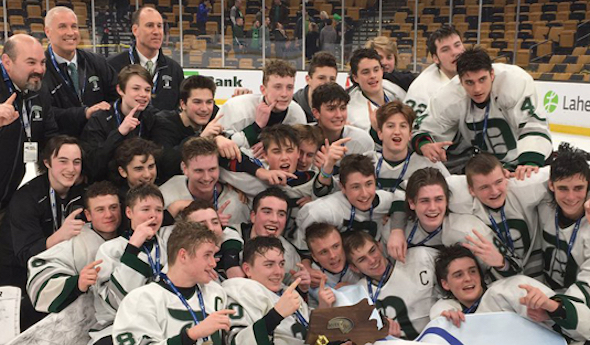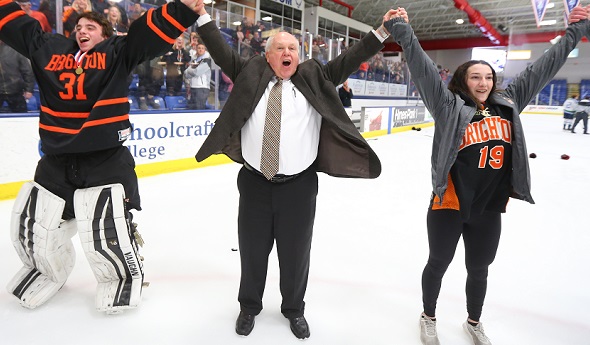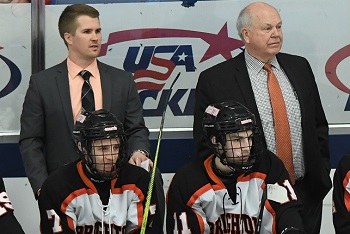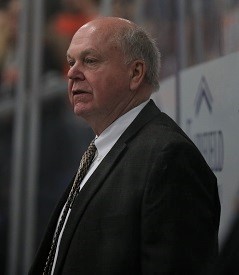
Title Time Differs Among Hockey States
July 12, 2019
By Rob Kaminski
MHSAA benchmarks editor
Next season’s three-week playoff format for the MHSAA Ice Hockey Tournament will fall more closely in line with similar postseasons for state associations around the country which sponsor the sport.
According to 2017-18 National Federation of State High School Associations participation statistics, 18 states sponsor boys ice hockey.
Michigan ranked third in number of schools involved with 240, behind Minnesota (282) and Massachusetts (278). In terms of overall participants, the MHSAA was fourth with 3,353, trailing Massachusetts (7,377), Minnesota (5,751) and New Jersey (3,492) and just ahead of New York (3,088). Wisconsin and Ohio boast more than 2,000 participants annually.
So, how do the tournaments compare among those states similar to Michigan? Most use longer tournament calendars than the two-week span previously employed by the MHSAA.
The timeframe for the season just past in the Minnesota tournament had most play beginning Feb. 21 and ending the same day as the MHSAA Finals, March 9. Some teams started on Feb. 19. The MHSAA dropped the puck for its first games on Monday, Feb. 25. It should be noted that Minnesota crowns just two champions annually, compared to the MHSAA’s three divisions.
Meanwhile, in Wisconsin and Ohio, just one school takes the statewide title each year, so it stands to reason that the postseason is spread out even further. Both states began the 2019 playoffs on Monday, Feb. 11.
Wisconsin’s tourney culminated on March 2 at Veteran’s Memorial Coliseum in Madison as teams played the Quarterfinals, Semifinals and Final over three consecutive days.
Ohio, meanwhile, took a week-long break following District Finals on March 1 or 2, then played the Semifinals and Final at Nationwide Arena in Columbus during March 8-9. This is similar to the rest period the MHSAA will enjoy moving forward from its Quarterfinals to the Semifinals and Finals in 2020.
Just as the season was reaching its pinnacle in Wisconsin, the postseason title chase was merely beginning in Massachusetts, where this year it opened Feb. 25.
Massachusetts is tied for the most divisions of the states studied here with four, but the top division is created with a different twist.
“The top division is often called the ‘Super 8’ or 1A. This tournament is set up differently than the other divisions,” said Massachusetts Ice Hockey Coaches Association President Dan Connolly. “The Super 8 is a double-elimination tournament. The seedlings for this tournament are done by power seeding via a committee using strength of schedule, record, team vs. teams under consideration and win-loss record down the stretch.”
Connolly said just 10 teams are chosen for the Super 8, and seed Nos. 7 through 10 must face off in a play-in game to join the top six. The two teams losing the play-in game return to their respective pre-assigned state divisions and can still win those tournaments. Such was the case in 2019, when Duxbury High lost in its bid to join the Super 8 field, but then won the Division 1 Final.
Like Michigan, those three divisions are based on enrollment, but unlike Michigan, the divisions are seeded based on winning percentage.
The Finals take place on a Sunday at the TD Garden in Boston, a celebration of hockey that features six games (four boys and two girls finals). This year’s event took place March 17, and nearly went into March 18. The Division 1 Final began at 9:59 p.m. as the previous contest, the Super 8 Final, went to four overtimes.
As mentioned, Minnesota’s tournament ended the same day as the MHSAA’s in 2019, and featured one overtime game among its two Finals at the Xcel Energy Center in St. Paul as Edina took the top class over Eden Prairie, 3-2.
The Sunday finales in Boston might seem foreign to followers of MHSAA tournaments, but New York also features a Sunday as the stage for its two state Finals, following Semifinals on Saturday. This year’s playoffs went from Feb. 20-March 10, culminating at the Harborcenter in Buffalo.
Neighboring New Jersey comes closest in length to the old MHSAA format with four divisions – three public and one non-public – taking just 14 days to determine winners at the Prudential Center in Newark. The 2019 titles were determined on Monday, March 4, with Semifinals the Wednesday prior.
PHOTO: Duxbury celebrated Massachusetts’ Division 1 championship this past season after missing out on making the “Super 8” bracket.

Brighton Coach's Impact 'Immeasurable'
By
Tim Robinson
Special for MHSAA.com
October 7, 2020
By Tim Robinson
Special for Second Half
Paul Moggach has never been much for looking back.
 And as he begins his first season away from the Brighton hockey program in more than three decades, he’s still looking ahead.
And as he begins his first season away from the Brighton hockey program in more than three decades, he’s still looking ahead.
“I’m thinking about what I’m going to miss more than the mark I left,” he said in a phone conversation last week. “I guess I enjoyed so much of the time I had, the opportunity to coach at Brighton, I’m thinking more how I fill the time and the things I'll miss.”
Moggach (pronounced MUG-uth) retired as Brighton’s coach this past summer after 25 seasons and having led five teams to MHSAA Division 1 championships. He compiled a record of 466-172-47 during that period.
But that’s not what he remembers most, nor why he wants people to remember him.
“I would like them to remember the teams and players who played for me and my assistants, more than me,” Moggach said. “We have so many blessings and opportunities in our lives, and hockey was one for me and hopefully for the players and assistants I worked with.”
One of those assistants was Kurt Kivisto, who joined the Bulldogs originally as a team manager more than 20 years ago and was a player at Brighton. He eventually won a national championship at Michigan State before rejoining the program as an assistant coach a decade ago.
“The No. 1 thing I’ll take from him is sticking by your beliefs and not sacrificing those beliefs for the team,” said Kivisto, who was named Moggach’s successor in September. “He sticks by those beliefs and ... he’s not willing to sacrifice that even if it could hurt the team. The character and integrity he has, how he treats people with fairness and what he believes is right is the biggest thing I’ll take.”
A stepson, Damon Whitten, played for Moggach at Brighton and at MSU before becoming an assistant coach and eventually the head coach at Lake Superior State, where he is in his eighth season.
Asked about Moggach’s impact at Brighton, Whitten said, “I’m not sure you can measure it. Your mind goes to the hockey players who have come to Brighton, and that’s a big part. But I think it goes beyond that. The money they’ve raised over the years for different families in need, for example. He’s had a big impact, and the players he had were a big part of that, but it goes well beyond that, and he did it the right way. Thirty-plus years (in the program), and I’m not sure you can count more than a handful of times where he made a bad decision or handled things poorly. He did things the right way, every day, all of the time, and I think it’s why he was so successful for so long.”
 The team’s charitable works were mostly kept under the radar – Moggach’s reasoning being his players had been given much, it was their turn to give back, and he didn’t want people thinking they did those things for publicity.
The team’s charitable works were mostly kept under the radar – Moggach’s reasoning being his players had been given much, it was their turn to give back, and he didn’t want people thinking they did those things for publicity.
Moggach joined Rick Bourbonais as an assistant at Brighton in the mid-1980s, then switched roles with him for the 1996-97 season.
He realized Brighton’s potential in the 1992-93 season, when the Bulldogs upset perennial state power Trenton in the Class A Quarterfinals before losing to Detroit Catholic Central in a Semifinal.
“That, to me, said, at least in my mind, that we can do this,” Moggach said. “It’s not impossible.”
He slowly began to build the program, getting good players and a schedule that would challenge them.
“You get the players by building a good culture,” he said. “Back in the day, when I started, we weren’t very disciplined and our league wasn’t very disciplined. So I think we realized we had to build that, and I could have an influence on building that in Brighton.”
Along with the culture, Moggach looked for an edge whenever he could find it. He was talked into making a trip to the Keweenaw Peninsula by one of his player’s parents, and found enormous benefits for his team, both competitively and in team bonding.
“It’s a lot about the little things we do,” he said, “that we find joy in, and create those opportunities. Creating the little moments really can build to bigger moments. We played capture the flag one day in about two feet of snow.
“Almost killed them,” he added, chuckling. The exhausted players didn’t have much left for the game that night, but spending time together for four days in a bus and hotel room always brought the team closer on and off the ice.
That first UP expedition also led to more teams making the trip, for team bonding and a glimpse of a part of the state, and themselves, they might never have seen otherwise.
“We didn’t do that for long,” he said. “But we always came back saying we were better together because of that experience.”
Bob Nelson had three sons play for Moggach, and Nelson’s wife, Kris, was president of the team’s booster club during their involvement over nearly a decade in Brighton hockey. Nelson also coached the program’s younger players for five seasons.
“We got to know the Moggachs really well,” he said. “It was a good experience, both as a coach and as a parent as well.”
Moggach introduced other things, including an emphasis on nutrition and off-ice training, that players resisted at first until they saw the benefits.
 He savored conversations with referees and opposing coaches before the games and even the occasional reporter after games.
He savored conversations with referees and opposing coaches before the games and even the occasional reporter after games.
But his first priority was the players. At times he would erupt in practice at a player or, more commonly, the team, and the boys soon learned to hear the message, not the volume. But for a couple of seasons, they also wrote some of his wilder statements down in a notebook after practice.
One year, they read some of them at the banquet, and after each one, Moggach’s wife, Sharon, would look at him and ask, “Did you really say that?”
Moggach would laugh and confess to remembering he had actually done so, then laughing.
“He knew part of what made the program good was his relationship to the players,” Nelson said. “If it was a good time, he wanted to enjoy it, even at his own expense at times.”
Moggach has staying in the background this offseason, letting Kivisto shape the team.
Asked if he were willing to fully switch coaching roles, as he and Bourbonais did a quarter-century ago, Moggach laughed.
“No,” he said emphatically. “Rick wasn’t in his 70s when we made the switch. Kurt needs his time. I’ll be there if he needs me.”
Moggach, who is 74, still works fulltime as the University of Michigan’s director of risk management.
He plans to spend more time with his wife and watch his grandsons play hockey, as well as catching some Lake Superior State games.
“I was really blessed to have Rick and Brownie (longtime assistant Mike Brown) along for the ride, and then to get Kurt involved,” Moggach said. “They weren’t the only ones, but they were the kids for me.
“The other thing is the support from the Brighton (High School) administration, the teachers, and our community. There are more people to thank than I could ever bring up. I do think that, all together, it was a great run. It couldn’t have been any better.”
PHOTOS: (Top) Recently-retired Brighton hockey coach Paul Moggach celebrates the 2018 Division 1 championship game win over Saginaw Heritage at USA Hockey Arena. (Middle) Former player Kurt Kivisto, left of Moggach during the 2018 Semifinal win over Detroit Catholic Central, served as an assistant before assuming the head coaching job in September. (Below) Brighton's 2018 championship was its fifth under Moggach. (Photos by Hockey Weekly Action Photos.)

